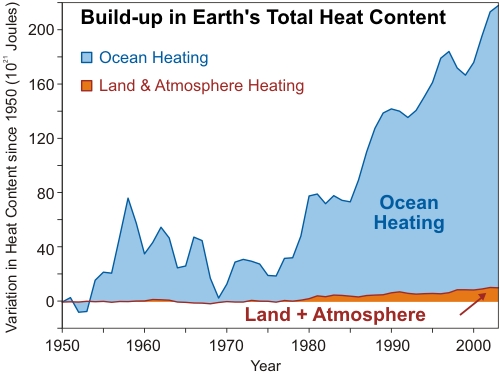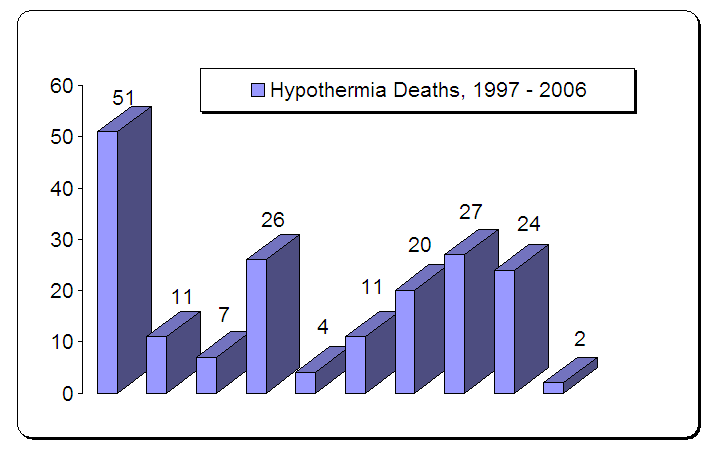Not So Cool Predictions
Posted on 4 January 2011 by dana1981
Claims have recently surfaced in the blogosphere that an increasing number of scientists are warning of an imminent global cooling, some even going so far as to call it a "growing consensus". There are two major flaws in these blog articles, (i) there is no scientific basis for claims that the planet will begin to cool in the near future, and (ii) many of the listed scientists are not predicting global cooling.
Global Cooling? Seriously?
In the face of the immense amount of evidence that the anthropogenic warming signal is driving the long-term temperature trend, it's hard to believe that any scientists would be predicting that this trend will suddenly reverse despite ever-increasing human greenhouse gas emissions. For example, according to NASA GISS, 2009 was tied for the second-hottest year on record, and 2010 will likely be the hottest in the past 130+ years. The first decade of the 21st century was the hottest decade on record, the evidence is overwhelming that humans are the dominant cause of the warming trend, climate scientists have even quantified the anthropogenic warming, and heat continues to accumulate in the planetary system:

Figure 1: Build-up in total Earth Heat Content since 1950. The data comes from Figure 6b in Murphy 2009. The ocean data was taken from Domingues et al. 2008
With all of this evidence that humans are causing rapid global warming with no end in sight, one has to wonder how on Earth any scientists would suddenly predict imminent global cooling.
Who Are these Scientists Predicting Cooling?
Some of the names listed in the blog above have been predicting imminent cooling for years now, like Don Easterbrook, Syun Akasofu, Habibullo Abdussamatov, Joe D'Aleo, and Nicola Scafetta. Many of these and other names on the list are not climate scientists, which is no doubt why the blogs claim that an increasing number of scientists as opposed to climate scientists are predicting imminent cooling.
One also has to wonder how long the planet must continue to warm while these individuals predict imminent cooling before they lose credibility. Don Easterbrook, for example, has predicted that we should see a global cooling of 2 to 5°F (1.1 to 2.8°C) from 2000 to 2030 based on a shift in the Pacific Decadal Oscillation. We're now one-third of the way into this supposed cooling period and the planet has warmed approximately 0.1°C. The accuracy of this prediction is not looking good.
Several other listed scientists have predicted that we should expect global cooling due to solar effects, like Scafetta, Abdussamatov, Landscheidt, Archibald, and D'Aleo. However, consider the fact that the longest solar cycle minimum in a nearly century just ended, and as mentioned above, the past two years have been among the hottest in the instrumental temperature record. Solar activity has been flat for the past 50 years, and yet the planet warmed approximately 0.6°C during that period. And now we're expected to believe that solar activity is not only going to significantly dampen the anthropogenic warming signal, but cause substantial cooling? These claims strain credulity.
Perhaps the worst part of these blog articles is that they attribute global cooling predictions to numerous scientists who have not made such claims. Let's look at some of the names on the list.
Mojib Latif
Dr. Latif predicted that between 2010 and 2020, the planet would warm approximately 0.4°C, and has said we risk "an unprecedented warming in the history of mankind if no measures are taken to cut global carbon dioxide emissions."
Noel Keenlyside
Dr. Keenlyside is the lead author on the Latif study referenced above which predicted 0.4°C warming from 2010 to 2020.
Anastasios Tsonis and Kyle Swanson
Regarding the supposed global cooling prediction in their study, Swanson has written "If this hypothesis is correct, the era of consistent record-breaking global mean temperatures will not resume until roughly 2020....What do our results have to do with Global Warming, i.e., the century-scale response to greenhouse gas emissions? VERY LITTLE, contrary to claims that others have made on our behalf....humanity is poking a complex, nonlinear system with GHG forcing – and that there are no guarantees to how the climate may respond."
Mike Lockwood
The Lockwood quote supposedly about global cooling simply discusses that decreased solar activity may impact winter weather in Europe, and has nothing to do with global temperatures whatsoever. Lockwood has performed numerous studies concluding that the Sun is not responsible for a significant amount of the recent global warming, and has not predicted global cooling.
James Overland
As with Mike Lockwood, the James Overland quote in question refers to winter weather, in Europe and the USA. Dr. Overland has neither predicted global cooling, nor disputes anthropogenic global warming. In fact, in the article linked above, Overland discusses how rapidly the Arctic is warming due to anthropogenic global warming, and that this will cause shifting weather patterns, leading to the snowy and cold winters in Europe and the USA. Not only is Overland not predicting global cooling in this article, he is explicitly talking about global warming.
There are likely other examples of supposed global cooling predictions being misattributed to climate scientists, but the examples listed above alone represent 20% of the list. Most of the other 'scientists' listed are not climate scientists, but rather meteorologists, engineers, astronomers, etc. And many of the other quotes refer to local weather rather than global temperatures.
Summary
There appear to be very few examples of climate scientists predicting imminent global cooling on this list. Perhaps that's because climate scientists understand that humans are and will continue to be causing rapid global warming for the foreseeable future. The few scientists who are predicting cooling have generally been doing so for several years, and are going against a very large body of scientific evidence that the planet will continue to warm rapidly.
This post is the Intermediate rebuttal (written by Dana Nuccitelli [dana1981]) of the skeptic argument "We're headed into cooling".































 Arguments
Arguments























 Source here.
Source here.
 0
0  0
0
 Why the disconnect? Good question. NOAA's data tracks from 1988 while the CDC goes back to at least 1979. Probably a wider definition of hypothermia deaths being used by the CDC (multiple ICD-9 codes). An example of apples-n-oranges in action.
Good comeback. Much better.
The Yooper
Why the disconnect? Good question. NOAA's data tracks from 1988 while the CDC goes back to at least 1979. Probably a wider definition of hypothermia deaths being used by the CDC (multiple ICD-9 codes). An example of apples-n-oranges in action.
Good comeback. Much better.
The Yooper







Comments